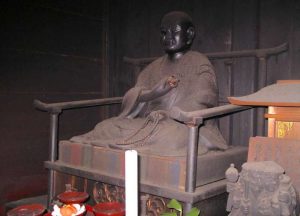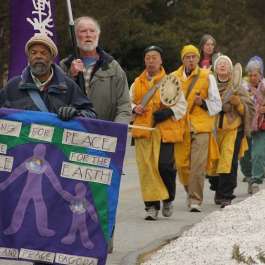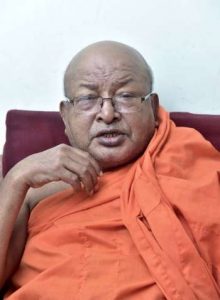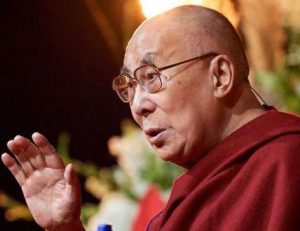The International Network of Engaged Buddhists (INEB) has issued a public statement calling for compassionate restraint and respect for the sanctity of life in Myanmar in response to the escalating violence and bloodshed that has followed in the wake of the military coup that overthrew the country’s civilian government in February last year.
INEB’s statement comes just days after the military junta announced on 25 July that it had executed four civilians—a former member of the civilian government, a pro-democracy activist, and two other political prisoners—who were accused of aiding “terror acts.” (Reuters) The country’s first executions in nearly 50 years have drawn widespread international condemnation.
In the open letter shared with BDG, dated 29 July and titled “Calling for Solidarity and Preserving the Sanctity of Life in Myanmar,” INEB states:
We are deeply shocked and saddened at the recent executions of four democratic activists Kyaw Min Yu, Phyo Zayar Thaw, Hla Myo Aung and Aung Thura Zaw in Insein Prison, Yangon, Myanmar. We offer our deepest condolences to the mourning families and solidarity to Myanmar people.
We are very concerned, as these executions have further implications to the 76 political prisoners, including 2 children, who were handed death sentences, as of 28 July 2022, according to the Assistance Association of Political Prisoners (AAPP). We urge the State Administration Council (SAC) led by Senior general Min Aung Hlaing to refrain from violence, and instead to address the political disagreements with compassion and kindness.

Expressing a commitment to solidarity with the people of Myanmar, INEB’s statement also calls attention to the deteriorating plight of Myanmar’s Muslim Rohingya population and other displaced communities, with a pledge to continue offering humanitarian support wherever possible.
Myanmar people are risking their lives to restore democracy, human rights and rule of Dhamma. We acknowledge the vital role Sanghas and other religious leaders are playing in restoring democracy through peaceful means, and in providing lifesaving humanitarian aid although they are at risk of losing their very lives. Meanwhile, we ask prominent Sanghas and religious leaders to tactfully intervene with the conflicting parties, using their moral authority to stop the bloodbath and to restore peace and stability.
We have seen the extraordinary sacrifices being made by ordinary young people and women for the future they rightfully belong to. Although INEB firmly disagrees with using armed resistance and violence as a means used by the democratic forces, we offer our empathetic understanding and compassion, fully acknowledging that Myanmar people haver faced unspeakable violence wrought by one of the strongest, well-equipped and most violent military forces in Southeast Asia, and that the conflict is unjustly asymmetric.
INEB, which is dedicated to overcoming suffering through the practice of socially engaged Buddhism, was established in Thailand in 1989 by the prominent academic and social critic Sulak Sivaraksa and a group of Buddhist and non-Buddhist thinkers and social activists. The organization was formed to connect engaged Buddhists around the world, to promote understanding, cooperation, and networking among inter-Buddhist and inter-religious groups, and to address global issues such as human rights, conflict resolution, and environmental crises. INEB’s global membership has grown to include monks, nuns, social workers, activists, and academics from more than 25 countries across Asia, Australasia, Europe, and North America, working together under the umbrella of kalyana-mitrata.*
In its call for peace and compassion in Myanmar, INEB lays out a three-point appeal to the military junta for restoring peace in the country:
1. Immediately stop using violence in addressing political disagreements, including the inhumane four cuts counter-insurgency tactics.
2. Immediately and unconditionally release all the political prisoners, including Daw Aung San Suu Kyi, U Win Myint and other prominent politicians, activists and those who are under the death row.
3. Urgently convene an all-inclusive dialogue, inviting the National Unity Consultative Council (NUCC), National Unity Government (NUG), Committee Representing Pyithu Hluttaw (CRPH), National League for Democracy (NLD) and other political parties, Ethnic Armed Organizations, democratic forces and other civil society organizations, being mediated by the Sangha, religious leader, UN and other relevant independent actors.
INEB concludes its message by calling on the people of Myanmar to remain strong in the face of oppression and to keep the light of hope alive, while refraining from resorting to violence and retaliation.
Click here to read the full text of INEB’s statement

Myanmar’s military declared a state of emergency on 1 February 2021, after detaining President Win Myint, State Counselor Aung San Suu Kyi, and other members of the governing National League for Democracy (NLD) party. The coup d’état took place just hours before the country’s new parliament was due to convene following a general election in November 2020, during which the NLD made substantial electoral gains.
The military, which had backed the parliamentary opposition in the national election, asserted that it staged the coup in response to electoral fraud, however the national election commission reported that there was no evidence to support these claims. The NLD won around 80 per cent of the available parliamentary seats in the 2020 vote.
The military-led State Administrative Council has consolidated its hold on power in the wake of the coup by conducting violent crackdowns on public dissent and street demonstrations, which have continued in defiance of the military-led suppression. Even the country’s venerated monastic sangha have found themselves in the military’s crosshairs.**
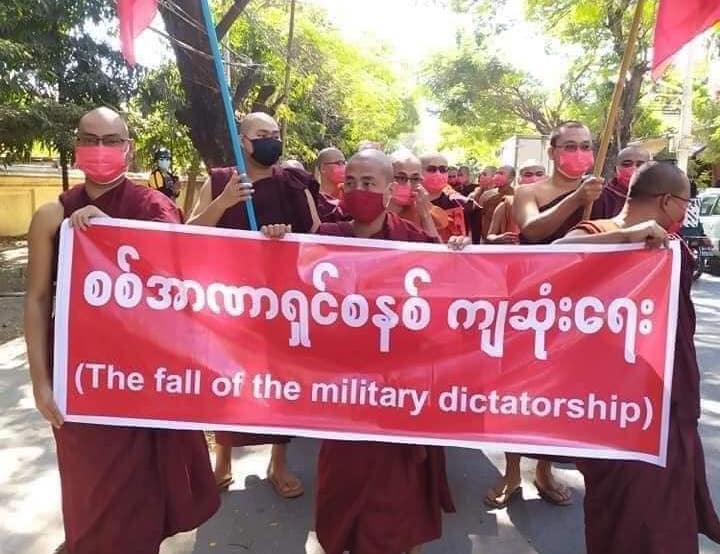
Despite more than a year of violent suppression, the junta continues to face widespread opposition to its rule. Crackdowns on peaceful protests and a civil disobedience movement (CDM) have resulted in a rise in armed civilian resistance, often with support from existing ethnic militia groups.
In April this year, a court in the capital Naypyitaw sentenced 76-year-old Aung San Suu Kyi to five years in prison for corruption, based on charges that she accepted bribes totaling US$600,000. Observers say the conviction is the first of a series of 11 criminal cases targeting Suu Kyi that could see the Nobel Peace Prize laureate facing a combined maximum jail term of 190 years.
In response to the crisis, INEB joined hands with the Clear View Project in Berkley, California, to launch an international appeal for urgent humanitarian relief for Buddhist monks and nuns living in the shadow of the junta.***
“The International Network of Engaged Buddhists and the US-based Clear View Project are coordinating an urgent appeal to raise funds to support the humanitarian emergency in Myanmar that focuses on Buddhist monks and nuns,” INEB said in a message shared with BDG. “[In February 2021] the Myanmar military staged what they considered would be a ‘quick coup’ in which democratically elected members of government, including President U Win Myint and State Counsellor Daw Aung San Suu Kyi, were detained. Since that time, the country has been in turmoil with the people responding by taking a civil disobedience movement to cities and villages across Myanmar.”
The Myanmar- and Thailand-based human rights organization Assistance Association for Political Prisoners (AAPP) reported that as of 2 August, 2,145 people were confirmed to have been killed by the military junta. The organization noted that the figure represented only deaths that the AAPP could independently verify and that the actual number was likely to be much higher. A total of 11,865 people were known to be in detention, including 77 post-coup death-row prisoners. Altogether, 119 people have sentenced to death—some in absentia, the AAPP said.
* Kalyaṇa-mittata (Pali) kalyaṇa-mitrata (Skt.), the Buddhist concept of spiritual friendship.
** Buddhist Monastics Targeted in Ongoing Crackdown by Myanmar’s Military Junta (BDG), Myanmar Junta Drops Plan to Place Buddhist Monks on Military Roadblocks (BDG)
*** INEB, Clear View Project Launch Humanitarian Appeal for Buddhist Monastics in Myanmar (BDG)
See more
International Network of Engaged Buddhists
Statement Calling for Solidarity and Preserving the Sanctity of Life in Myanmar (International Network of Engaged Buddhists)
URGENT APPEAL for Humanitarian Relief to support Buddhist Monks and Nuns in Myanmar’s Political Movement Against Military Dictatorship (International Network of Engaged Buddhists)
Daily Briefing in Relation to the Military Coup (Assistance Association for Political Prisoners)
World condemns Myanmar junta for ‘cruel’ execution of activists (Reuters)
Related news reports from BDG
Four Buddhist Monks Killed During Military Strike in Myanmar
Buddhist Monk, Civilians Killed as Junta Troops Raze Villages in Northern Myanmar
Myanmar Junta Has Destroyed Over 100 Buddhist Monasteries, Christian Churches – Report
Hundreds of Buddhist Monks Flee Temples in Eastern Myanmar as Violence Escalates
Engaged Buddhism: INEB Launches Sangha for Peace to Tackle Regional Religious and Ethno-Nationalist Tensions
Religious Leaders in Myanmar Decry Persecution by Military Junta
80-Year-Old Monk Becomes a Symbol of Hope for Myanmar Buddhists
INEB, Clear View Project Launch Humanitarian Appeal for Buddhist Monastics in Myanmar
Engaged Buddhism: INEB Shares Final Report on Mindful Action: COVID-19 Emergency Relief Fund
UPDATE: INEB Calls for Reconciliation in Myanmar as Pro-democracy Protests Turn Violent
Related features from BDG
Myanmar: A Month into the Coup
The Other Shoe Drops: Reflections on Myanmar’s Latest Coup
A Reflection on the Intellectual and Socio-Cultural History of Buddhism in Myanmar
Sea of Suffering: The Rohingya and the Conundrum of Buddhist Terror
Buddhistdoor View: Reconciling Nationalism and Buddhism



